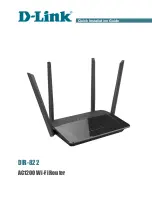
RUGGEDCOM ROS
User Guide
Chapter 3
Device Management
Configuring an Ethernet Port
73
Parameter
Description
Default:
1
The port number as seen on the front plate silkscreen of the
switch.
Name
Synopsis:
Any 15 characters
Default:
Port x
A descriptive name that may be used to identify the device
connected on that port.
Media
Synopsis:
{ 100TX, 10FL, 100FX, 1000X, 1000T, 802.11g,
EoVDSL, 100TX Only, 10FL/100SX, 10GX }
Default:
100TX
The type of the port media.
State
Synopsis:
{ Disabled, Enabled }
Default:
Enabled
Disabling a port will prevent all frames from being sent and
received on that port. Also, when disabled link integrity signal
is not sent so that the link/activity LED will never be lit. You may
want to disable a port for troubleshooting or to secure it from
unauthorized connections.
NOTE
Disabling a port whose media type is set to
802.11g
disables the corresponding wireless module.
AutoN
Synopsis:
{ Off, On }
Default:
On
Enable or disable IEEE 802.3 auto-negotiation. Enabling auto-
negotiation results in speed and duplex being negotiated upon
link detection; both end devices must be auto-negotiation
compliant for the best possible results. 10Mbps and 100Mbps
fiber optic media do not support auto-negotiation so these media
must be explicitly configured to either half or full duplex. Full
duplex operation requires that both ends are configured as such
or else severe frame loss will occur during heavy network traffic.
Speed
Synopsis:
{ Auto, 10M, 100M, 1G }
Default:
Auto
Speed (in Megabit-per-second or Gigabit-per-second). If auto-
negotiation is enabled, this is the speed capability advertised by
the auto-negotiation process. If auto-negotiation is disabled, the
port is explicitly forced to this speed mode.
AUTO means advertise all supported speed modes.
Dupx
Synopsis:
{ Auto, Half, Full }
Default:
Auto
Duplex mode. If auto-negotiation is enabled, this is the duplex
capability advertised by the auto-negotiation process. If auto-
negotiation is disabled, the port is explicitly forced to this duplex
mode.
AUTO means advertise all supported duplex modes.
Flow Control
Synopsis:
{ Off, On }
Default:
On
Flow Control is useful for preventing frame loss during times of
severe network traffic. Examples of this include multiple source
ports sending to a single destination port or a higher speed port
bursting to a lower speed port.
















































